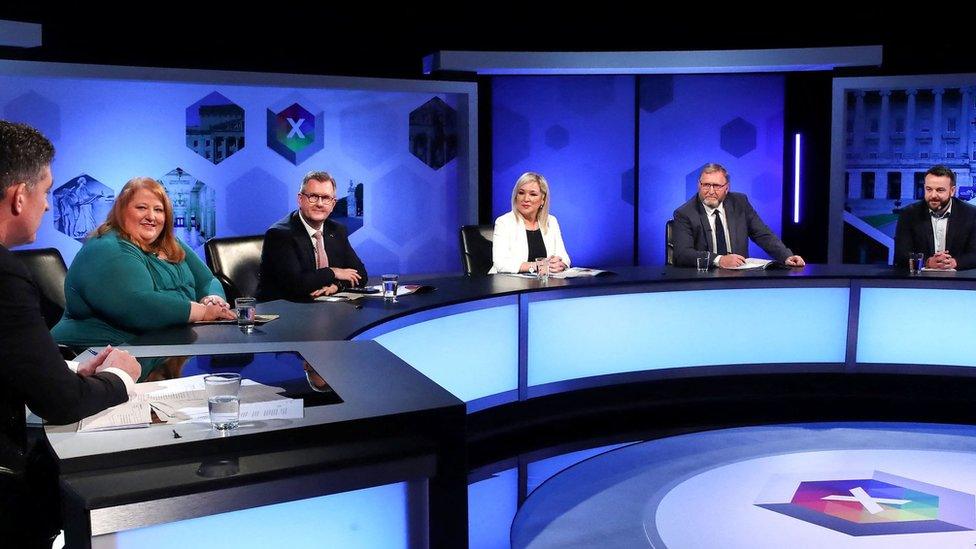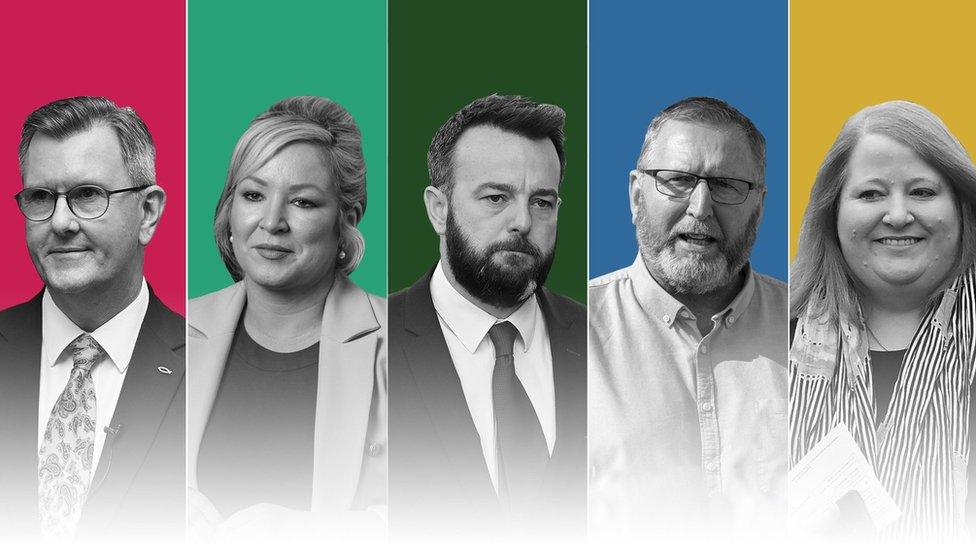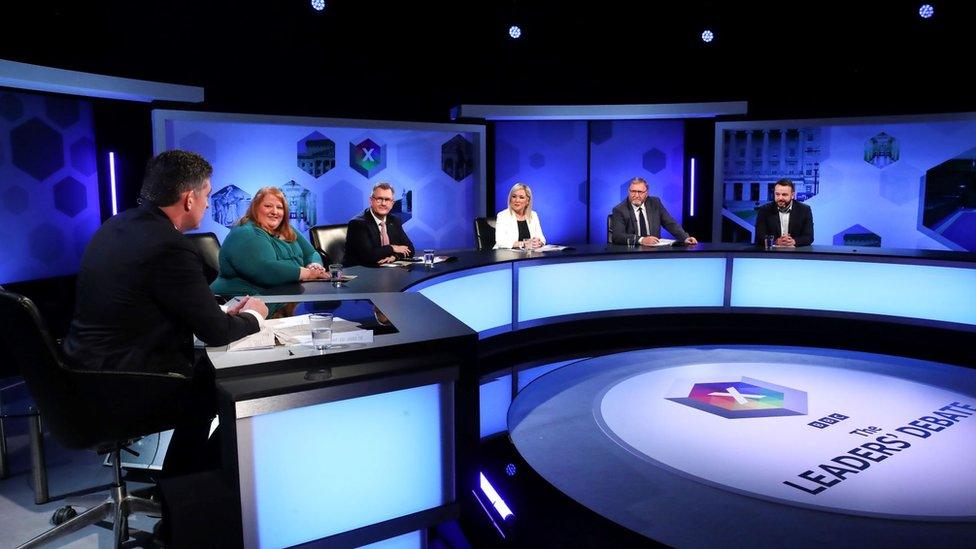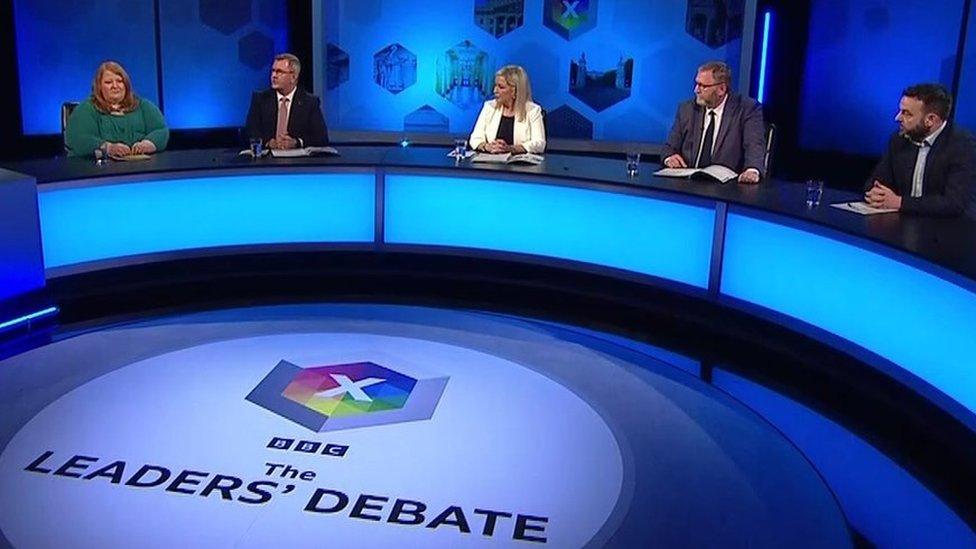NI election 2022: Key leaders' debate claims fact-checked
- Published

Northern Ireland's political leaders went head-to-head on Tuesday night
Leaders of Northern Ireland's five biggest political parties clashed on the BBC on Tuesday in the final TV debate before the assembly election.
Over the course of an hour they answered questions from a studio audience on a range of topics from the health service to the cost of living crisis.
Taking part were Sir Jeffrey Donaldson of the Democratic Unionist Party, Michelle O'Neill of Sinn Féin, Colum Eastwood of the SDLP, Doug Beattie of the Ulster Unionist Party and Naomi Long of Alliance.
BBC News NI's correspondents examined some key claims made and whether they were accurate.

The protocol has increased costs for bringing food in to Northern Ireland, making food more expensive for consumers - Sir Jeffrey Donaldson

This was understood from the moment the deal was signed: a UK government analysis from October 2019 stated that the protocol would result in "additional administrative costs to businesses".
Some mitigating measures were introduced but additional costs are still there - borne out by business surveys and anecdotal evidence.
Logically these costs have to show up somewhere in the economy as reduced corporate profits, higher consumer prices or a mix of the two.
But assessing the size of the costs and where they fall is not easy.
In January the DUP Economy Minister Gordon Lyons was asked in the assembly to provide an assessment.
He said it was: "Difficult to provide a complete analysis given that the protocol has not been fully implemented."
He nodded to a disputed estimate from the Ulster University economist Esmond Birnie.
Mr Lyons' party leader Sir Jeffrey in Tuesday night's debate drew on alternative sources; he cited a survey of grocery costs by market research company Kantar and a claim that the cost of moving goods from Great Britain to Northern Ireland has increased by 27%.
The Road Haulage Association (RHA) said it is the source of the 27% figure.
It is an indicative cost increase, based on information from local hauliers, predominately larger operators.
The information was not gathered as part of a formal survey.
The RHA said there are variations in the additional costs, depending on what is being carried with the highest costs for those regularly carrying food products.
Kantar told BBC News NI the source of the data on grocery costs was a report it produced for the Department of the Economy.
It said as a result it could not make the data publicly available, as it belonged to the department.
The BBC has asked the department for the data.

'I am not fixated on a date for a border poll' - Michelle O'Neill

Pushed on when she wanted a referendum on Irish unity, Michelle O'Neill said: "I want to have it whenever is the right time. I'm not fixated on a date"
However Sir Jeffrey Donaldson countered: "Sinn Féin say they're not that interested in a border poll.
"It is at the heart of their manifesto. They are demanding a date."
Under the section planning for unity, the Sinn Féin manifesto, external lists one of the party's priorities as: "Securing a date from the Irish and British governments for the referendum on unity provided for in the Good Friday Agreement."
Michelle O'Neill however said the main issue in this election is the cost of living crisis and that is what she has reiterated throughout the campaign.

Conor Murphy recently allocated £400m to the health service without an executive being in place, so it's not impossible to spend money currently in Stormont's bank accounts - Sir Jeffrey Donaldson

Sir Jeffrey was pushed on whether money sitting in Stormont's bank accounts could be spent to help alleviate the cost of living crisis in the absence of an executive, which collapsed after the DUP withdrew Paul Givan as first minister.
The £400m he mentioned came from increases in national insurance rates announced by Westminster earlier this year and is part of the Barnett consequential, which helps calculate what is given to devolved budgets.
There was direction from Westminster that the funding should be allocated to health and social care across the UK.
Therefore there was an understanding among the executive that this money would be allocated to the Department of Health and it could plan on that basis.

'Retrofitting homes with insulation would make people's homes warmer and reduce their energy bills long term' - Naomi Long
Analysis: Louise Cullen, NI agriculture and environment correspondent
According to the Department for Communities' most recent Housing Statistics bulletin, the majority of Northern Ireland's houses are heated by oil (68%) or gas (24%), both of which have risen rapidly in price in recent months.
Northern Ireland's energy strategy, launched in December 2021, prioritises retrofitting.
It says domestic dwellings here "currently use more energy than anywhere else in the UK or the Republic of Ireland".
The Housing Executive says about 7% of occupied houses in Northern Ireland failed the decent homes standard in 2016 - a decent home is defined as one that is wind and weather tight, warm and has modern facilities.
But none of this comes cheaply - the Housing Executive estimates it would cost £9.2bn to retrofit 600,000 houses across Northern Ireland.

'We should look at making free school meals made universal' - Colum Eastwood

All parties want to keep providing money to families of about 100,000 children who are eligible for free school meals during school holidays, but the SDLP leader went further in Tuesday night's debate.
That would mean a daily free meal to all 340,000 pupils in schools in Northern Ireland.
It is not clear how much that would cost and education is facing other financial constraints which could see school budgets squeezed in the years ahead and other services under pressure.
Many school heads, for instance, say they are seeing an increasing number of pupils who need support for their mental health.
Related topics
- Published3 May 2022

- Published4 May 2022

- Published4 May 2022
